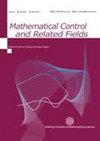Feedback control of isolation and contact for SIQR epidemic model via strict Lyapunov function
IF 0.9
4区 数学
Q1 MATHEMATICS
引用次数: 4
Abstract
We derive feedback control laws for isolation, contact regulation, and vaccination for infectious diseases, using a strict Lyapunov function. We use an SIQR epidemic model describing transmission, isolation via quarantine, and vaccination for diseases to which immunity is long-lasting. Assuming that mass vaccination is not available to completely eliminate the disease in a time horizon of interest, we provide feedback control laws that drive the disease to an endemic equilibrium. We prove the input-to-state stability (or ISS) robustness property on the entire state space, when the immigration perturbation is viewed as the uncertainty. We use an ISS Lyapunov function to derive the feedback control laws. A key ingredient in our analysis is that all compartment variables are present not only in the Lyapunov function, but also in a negative definite upper bound on its time derivative. We illustrate the efficacy of our method through simulations, and we discuss the usefulness of parameters in the controls. Since the control laws are feedback, their values are updated based on data acquired in real time. We also discuss the degradation caused by the delayed data acquisition occurring in practical implementations, and we derive bounds on the delays under which the ISS property is ensured when delays are present.基于严格Lyapunov函数的SIQR流行病模型隔离与接触反馈控制
我们使用严格的Lyapunov函数推导出隔离、接触调节和传染病疫苗接种的反馈控制律。我们使用SIQR流行病模型来描述通过检疫隔离的传播,以及对免疫持久的疾病的疫苗接种。假设大规模疫苗接种无法在目标时间范围内完全消除疾病,我们提供反馈控制律,使疾病达到地方性平衡。当不确定性被视为迁移扰动时,我们证明了在整个状态空间上的输入-状态稳定性(ISS)鲁棒性。我们使用ISS Lyapunov函数来推导反馈控制律。我们分析中的一个关键因素是,所有隔间变量不仅存在于李雅普诺夫函数中,而且存在于其时间导数的负确定上界中。我们通过仿真说明了我们方法的有效性,并讨论了参数在控制中的有用性。由于控制律是反馈的,控制律的值根据实时采集的数据进行更新。我们还讨论了在实际实现中发生的延迟数据采集引起的退化,并推导了在存在延迟时确保ISS属性的延迟边界。
本文章由计算机程序翻译,如有差异,请以英文原文为准。
求助全文
约1分钟内获得全文
求助全文
来源期刊

Mathematical Control and Related Fields
MATHEMATICS, APPLIED-MATHEMATICS
CiteScore
2.50
自引率
8.30%
发文量
67
期刊介绍:
MCRF aims to publish original research as well as expository papers on mathematical control theory and related fields. The goal is to provide a complete and reliable source of mathematical methods and results in this field. The journal will also accept papers from some related fields such as differential equations, functional analysis, probability theory and stochastic analysis, inverse problems, optimization, numerical computation, mathematical finance, information theory, game theory, system theory, etc., provided that they have some intrinsic connections with control theory.
 求助内容:
求助内容: 应助结果提醒方式:
应助结果提醒方式:


